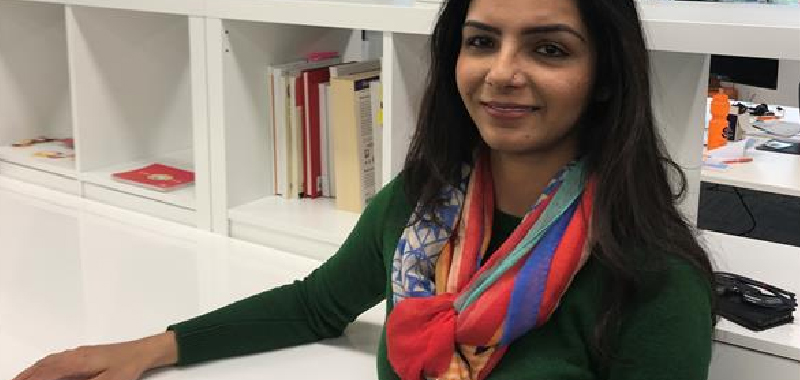
When watching a Play or an Opera, the greatest attention is usually only on those who are directly on stage. On many Company Websites or Brochures, it is a similar situation. If real employees are visible at all, they are usually from marketing or sales for example.
However, as we know, it is not only those at the front that contribute to the success of any production or product, but there are also many people involved who are unseen and work very hard behind the curtains.
In a software company, Developers may be the first to come to mind, which is certainly not wrong. In my experience, one special department which has one of the most important tasks of all, is often overlooked, that is the “The Product Management Team”.
Here, important decisions about the direction in which the software will be developed and what requirements it must meet, are made. That is why I was excited to talk to Lia Ghita from Sibiu, who is one of the Product Managers responsible for imc's main product, the Learning Management System (LMS) imc Learning Suite.

Lia Ghita
Job | Product Manager
Working in | Sibiu, Romania
Worked at imc since | 2014
Super power | pro-activness & problem-solving
Favourite food | Mam's pasta with tomatos and mushrooms

Hi Lia, thanks for joining! So, first of all: How would you describe your job to a child?
Maybe not to a five-year-old but rather to an older child who ever saw an orchestra perform, I could describe my role as something like an orchestra conductor. The conductor is the one who helps everyone in the orchestra to reach the tone, the amplitude of the sound and tells the different instruments when to play.
In a way, a product manager’s role is similar, as we coordinate, prioritise, and balance the tasks and the different roles involved in the software development process.

How did you get into Product Management?
I would somehow call it a series of fortunate events that led me here. Although I studied computer science in high school, I wanted to try a completely different path and ventured in studying law.
However, halfway through my studies I realised that I would not be happy being a Lawyer so after graduating I started working as a Customer Service Representative in a multinational company. As part of that role, undertaking technical support among other things, I started to come closer again to the computer science domain.
I always think about it as transitioning from one type of code to another...
I first started with imc as part of the Quality Assurance Team and that experience helped me form an understanding about LMS use cases and our customers’ workflows. Not long after, I was given the opportunity to work with a dedicated team of developers to enhance our native apps, which opened the door to the universe of Product Management.
So how would you describe a typical day?
I think the easiest way to explain this, is to take you a little through the steps in Product Management, because there is no such thing as a typical day.
We always start from a business need, meaning we identify a direction in which we want to go with the product. Based on that, we identify the concrete use cases and create a roadmap. In that phase we are also in close contact to our customers and based on their requirements, we plan the next release.
Once the scope for an innovation package is agreed, we prepare the functional specifications and work closely with our Design Team to prepare workflow mock-ups. We groom with our development team to identify solutions and have them estimated and then we proceed with the implementation, in an Agile way.
We usually close an innovation pack with an internal knowledge transfer and documentation of the recently implemented enhancements.
Throughout all these phases, we are in contact with all the roles within imc and our customers, which can make it a very diverse experience from one day to the other.

Which character traits are particularly important for your job?
As a Product Manager, you must be a very pro-active person and you must be able to organise yourself. In my role you do not get a set of tasks and someone tells you to do these or that.
You must know the overall goal and work towards it. You must be able to prioritise and to organise yourself, your team and the time accordingly. The mindset is also important. The mindset that tells you: “Just do it, find a solution, get out there and solve the problem!”
Subsequently, what is your most valuable skill?
I would say problem-solving skills and the joy I find in the process of figuring out the solution for a complex problem. This is one trait that brought me closer to the development part of the process and to the many debugging sessions together with the developers to try and find solutions together.

What is the strangest thing that you have ever experienced in your job?
The example that comes to my mind was not so much strange but different and unique.
Recently we had a workshop with a customer from Italy and the customer was not so fluent in English, although they could understand it. I understand Italian, as it’s very similar to my native language Romanian, but I can’t speak it. So finally, we ended up with me speaking English and the customer speaking Italian – and it worked!
What is special about working at imc compared with other companies?
Well, I’ve only worked for one other company so far. There I also changed different roles and learned a lot, but here is a completely new level.
I really enjoy getting to know different aspects of running the E-Learning business and I also like the size of the company, it’s not too big or too small. You still have the chance to get in contact with other departments and colleagues from different roles.
I think it is important to get out of the comfort zone and to extend it. At imc you have the chance to experience that every day.
What’s the most important thing you’ve learnt since working here?
I have learned that it’s never too late to learn new things. Since joining imc I had the opportunity to explore once again programming, which even motivated me to pursue my second bachelor’s degree, this time in Computer Science.

What motivates you?
Reactions like we recently received in our knowledge transfer! This is an internal format where we introduce new releases to all our colleagues from imc.
In the last knowledge transfer, when we demonstrated the highlights of the new release, our colleagues from all over the world were so impressed and happy and wrote things like “Wow, this is such a great feature”, or “looks awesome, great job”. It is such a good feeling to see your work being appreciated after you put in so much effort.
Do you have a professional or personal role-model?
Since I started in Product Management and even imc, it was Daniel Dahrendorf who I worked with closely. I appreciate his calm and patience. He can transfer information in a very relaxed manner. This is something I admire as I sometimes struggle a little to stay calm, but I try to work on that and take him as an example.
Another very important question: Chips or chocolate?
Chips. I don’t like sweet things most of the time.

And finally: Your team in one sentence?
We're united, supportive, and share a good energy, it’s just a pleasure to work together!
Thank you so much Lia for the great interview and all the best for the future!

Software developers are also just human
Software developers are also just human, like Sim, who works for imc in Melbourne. We talked about her daily work, cultural differences and personal role models.

More than a notorious nagger
Only notorious naggers work in quality assurance? Not at all! QA specialist Ioana explains what icebergs have to do with her daily work, how she actually got to her job and what you need for it.
Would you like to know more about imc as an employer? Then take a look at our career section, maybe there is a suitable position for you.
We are also always happy to receive unsolicited applications!
